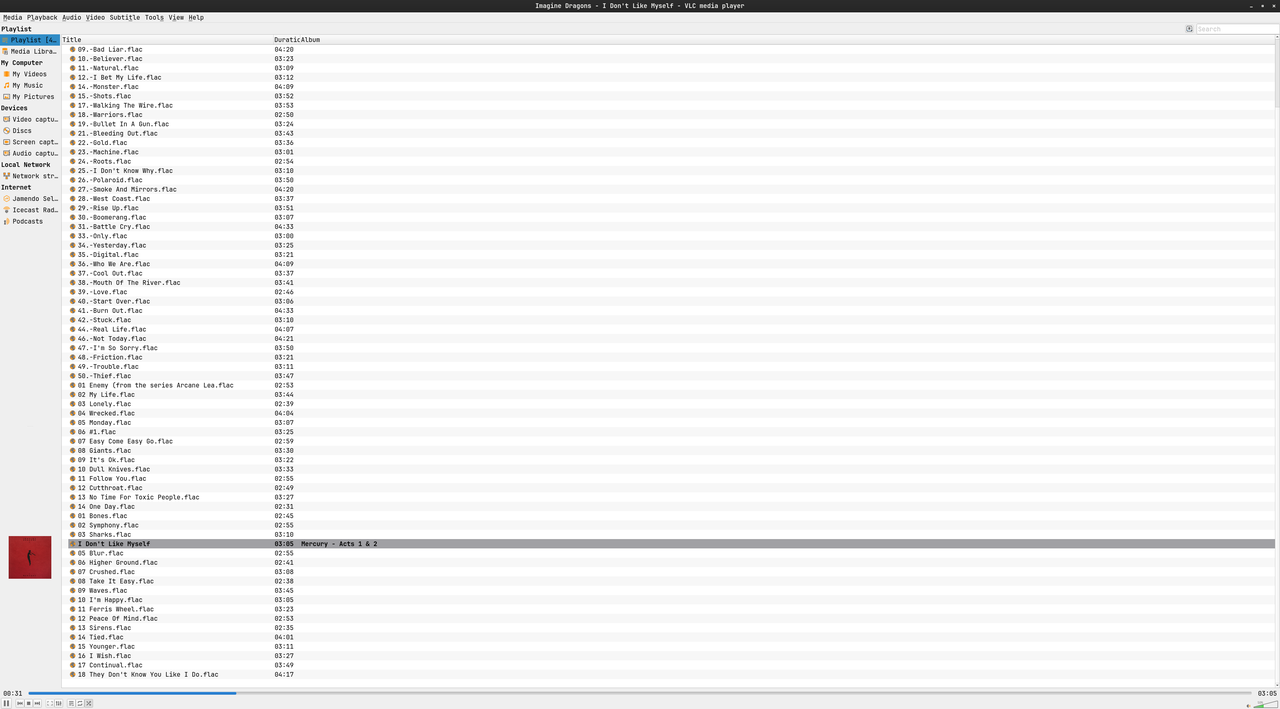VLC: How to Generate .M3u Playlists
VLC: how to generate .m3u playlists
Note
The new C language version can be found here: (30.12.2023 update)
It's 6x faster than the bash script (1:52/11:08)
VLC is a free and open-source media player, and it is PORTABLE and CROSS-PLATFORM.
In order to have a better user experience, without paying a penny, it is the best choice.
"M3U (MP3 URL or Moving Picture Experts Group Audio Layer 3 Uniform Resource Locator in full) is a computer file format for a multimedia playlist. One common use of the M3U file format is creating a single-entry playlist file pointing to a stream on the Internet. The created file provides easy access to that stream and is often used in downloads from a website, for emailing, and for listening to Internet radio."
—Wikipedia
As .m3u is one of the playlist format that VLC supports, and its format can be easily followed by a shell script, I chose it to make a list of all my Internet media files.
1 Syntax of .m3u
An .m3u file is a plain text file that specifies the locations of one or more media files. Each entry carries one specification, which can be:
- an absolute local path:C:\Music\I_love_this_one.mp3
- a relative path: This_one_as_well.mp4
- an URL: www.music.com/123.mkv
The extended .m3u syntax we will use in the script: 1. #EXTM3U: file header, should be the first line 2. #EXTINF: track information: #EXTINF:123,Title
All the syntax for .m3u can be checked on Wikipedia.
2 My file system
tree Music -L 1
Music/ ├── Dr._Dre │ ├── 02 - Deep Cover.flac │ ├── ... ├── Imagine_Dragons ├── LOL_BGM ├── OneRepublic ├── The_Fat_Rat └── The_Music_of_Grand_Theft_Auto_V
And all those files are published on the Internet, so they can be accessed by http://ipv4.bajzc.com:81/Music/... (use port 81 as the NSP blocked the default port: 80)
3 Script
Note
This script might fit for me, you can modify it by following the explanation for each function.
#! /bin/bash set -e export ListPath=/var/www/html/PlayLists Backup(){ cd $ListPath for name in $(ls -c) do mv $name ./.$name.bak done } ListMovie(){ cd $ListPath/../ echo "#EXTM3U" >> $ListPath/ALL.m3u find Movie/ -mindepth 1 -maxdepth 2 | while read line do if [ -d "$line" ]; then echo -n "#EXTGRP " >> $ListPath/ALL.m3u echo $(echo "$line" | sed -e "s/\([[:print:]]*\/\)*//g") >> $ListPath/ALL.m3u else duration=$(ffmpeg -i "$line" 2>&1 | grep "Duration"| cut -d ' ' -f 4 | sed s/,// | sed 's@\..*@@g' | awk '{ split($1, A, ":"); split(A[3], B, "."); print 3600*A[1] + 60*A[2] + B[1] }') if [ "$duration" == "0" ] || [ "$duration" == "" ]; then printf "$line is not a media file, duration: $duration\n" continue fi echo -n "#EXTINF:$duration," >> $ListPath/ALL.m3u echo $(echo "$line" | sed -e "s/\([[:print:]]*\/\)*//g") >> $ListPath/ALL.m3u echo $(echo "$line" | sed -e 's/^/http:\/\/ipv4.bajzc.com:81\//') >> $ListPath/ALL.m3u echo >> $ListPath/ALL.m3u fi done } ListAlbum(){ cd /var/www/html/ find Music/ -maxdepth 1 -mindepth 1 -type d | while read line do Album=$(echo "$line" | sed -e "s/\([[:print:]]*\/\)*//g") echo $Album echo "#EXTM3U" > $ListPath/$Album.m3u echo "#EXTGRP" >> $ListPath/$Album.m3u echo "#EXTGRP" >> $ListPath/ALL.m3u find $line -type f | while read path do duration=$(ffmpeg -i "$path" 2>&1 | grep "Duration"| cut -d ' ' -f 4 | sed s/,// | sed 's@\..*@@g' | awk '{ split($1, A, ":"); split(A[3], B, "."); print 3600*A[1] + 60*A[2] + B[1] }') if [ "$duration" == "0" ] || [ "$duration" == "" ]; then printf "$path is not a media file, duration: $duration\n" continue fi header="#EXTINF:$duration,$(echo "$path" | sed -e "s/\([[:print:]]*\/\)*//g")" url="$(echo "$path" | sed -e 's/^/http:\/\/ipv4.bajzc.com:81\//')" printf "$header\n$url\n\n" >> $ListPath/$Album.m3u printf "$header\n$url\n\n" >> $ListPath/ALL.m3u done done } compress(){ cd $ListPath tar -czvf PlayList.tar.gz *.m3u zip -qr PlayList.zip *.m3u } Backup ListMovie ListAlbum compress unset ListPath
Note
You may need to install ffmpeg, zip on your host system.
Backup()
line 6-9: backup all files in $ListPath
ListMovie()
line 13: change the directory to where the Movie is.
line 14: print .m3u header to the output file $ListPath/ALL.m3u
line 15: list all the files and directories in Movie/ and assign the path to line
line 17: whether line is a path to a directory
line 19: use regular expression to get the name of directory
line 21: use ffmpeg to get the duration of a media file in seconds
line 28: use regex again to convert the relative path into URL
ListAlbum()
line 36: only search for directories in one depth
line 38: use regex to get the name of album
compress()
line 60: compress into .zip
line 61: compress into .tar.gz
The output can be seen here
4 Summary
This script still has some limitations, such as it cannot deal with the SPACE in directories' name. Because find won't return the path in C-style (while ls can do it). For example: The Music of Grand Theft Auto V, should be The\ Music\ of\ Grand\ Theft\ Auto\ V. Otherwise Bash cannot locate it.
However, if the file name contains those characters will be fine. Thanks to ffmpeg, path can be passed as a string. (Line 21)
After all, open a m3u file in VLC:
